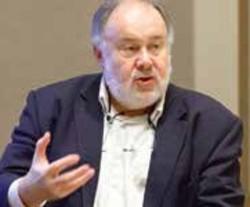Summary:
The seminar will provide a roadmap for resolving conflict by identifying, adapting, responding and leading in the face of a complex health care system.
SUMMARY: The seminar will provide a roadmap for resolving conflict by identifying, adapting, responding and leading in the face of a complex health care system.

When things are going well, it hardly matters who’s running the show. Just about anyone can do that. But in times of conflict, change or crisis — as is common in health care today, as well as every other industry — leaders need to know what to do. Winging it doesn’t work.
“Physician leaders need to be adaptive to changes in technology, changes in the workforce, changes in the finances of health care and changes in the population,” says Leonard Marcus, PhD, the founding director of the Program for Health Care Negotiations and Conflict Resolution at the Harvard T.H. Chan School of Public Health. “And that’s the key distinction between managing an organization and leading an organization. Health care is changing so rapidly, leaders must be equipped to adapt.”
The value and importance of meta leadership — leading leaders, and reaching across organizations to build strategy — comes into focus during the American Association for Physician Leadership’s 2017 Fall Institute, Nov. 3-7 at Scottsdale, Arizona.
Marcus will lead a one-day seminar on the topic as a roadmap for resolving conflict by identifying, adapting, responding and leading in the face of a complex health care system. It’s about connecting otherwise-compartmentalized departments within an organization in ways that allow the organization — and its people — to thrive. The result is greater unity and production within departments.
It is designed for physician leaders who are interested in advancing their careers in leadership. “Some people have natural skills,” Marcus says, “but just as you’re going to be a great orthopedist, you have to study orthopedics; if you’re going to be a great leader, you have to study leadership.”
As some physician leaders discover the hard way, leadership is not something best learned on the fly. Or as Marcus puts it: “The path toward success is not simply by the seat of your pants.”
Marcus describes scenarios in which physicians may find themselves in high-stress, life-and-death or high-consequence financial situations — a downward trajectory he refers to as “going to the basement.” It’s when a person senses conflict, feels threatened or surprised, and instantly goes into survival mode.
“The class teaches people to identify these situations, provides steps to get out of the basement, steps to get others out of the basement, and steps to build that culture in the organization so that people know how to deal with crisis situations, varying from mass-casualty events to personnel issues,” Marcus says.
How a crisis is handled, of course, depends on the individual in charge. Some welcome the challenge while others like to think the problem will simply disappear if they ignore it.
“They either deny it or they try and avoid it,” Marcus says, “and that’s when a problem can turn into a crisis. [If] you don’t have the discipline and training and leadership, [avoidance] seems like a viable option.
“For a physician leader who’s really intrigued and committed to this notion of leadership, it’s a very challenging and very exciting time. It’s an opportunity to have a huge impact. Some people say, let’s work with it and let’s ensure that whatever is on the other side of what’s about to happen, we will be a success. Those are the organizations that will survive and thrive beyond this period.”
Topics
Judgment
Related
Championing Physician Leadership Development: AAPL's Five-Decade Commitment Meets Healthcare's Critical Moment“Profiles in Success”: Certified Physician Executives Share the Value and ROI of their CPE EducationPhysician Leadership: What’s Different, What’s New With AAPLRecommended Reading
Professional Capabilities
Championing Physician Leadership Development: AAPL's Five-Decade Commitment Meets Healthcare's Critical Moment
Professional Capabilities
“Profiles in Success”: Certified Physician Executives Share the Value and ROI of their CPE Education
Professional Capabilities
Physician Leadership: What’s Different, What’s New With AAPL
Professional Capabilities
We Want to Make Ourselves Better
Professional Capabilities
Meet your AAPL Board of Directors: Peter Paige, MD, MMM, FACEP
Professional Capabilities
Finding Her Story Again


